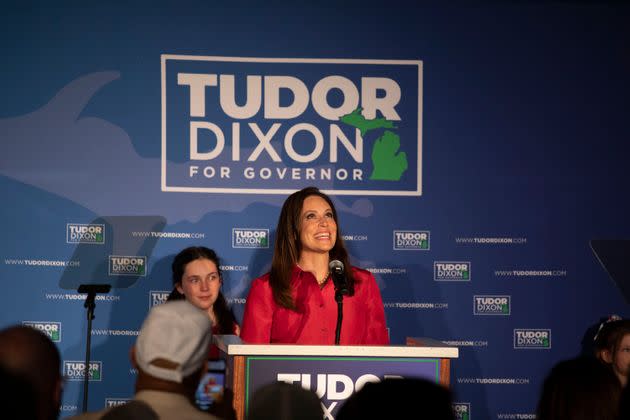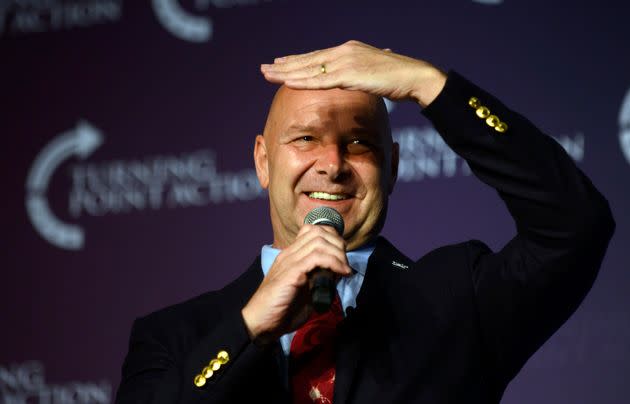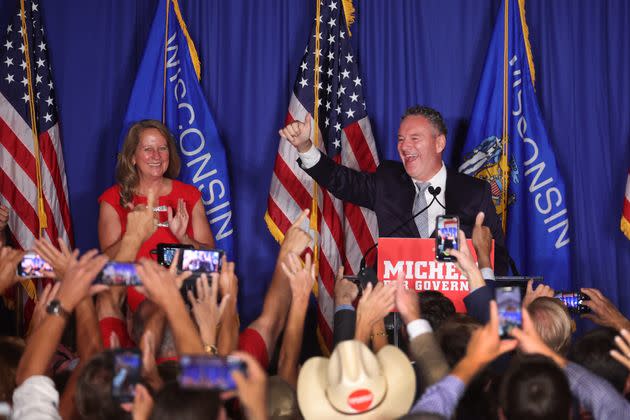GOP Candidates Take Extreme Positions In Races Where Abortion Access Is On The Line
- Oops!Something went wrong.Please try again later.
Michigan Republican gubernatorial nominee Tudor Dixon told a local news show on Aug. 19 that she doesn’t support an exception for rape in an abortion ban because the birth of the child provided “healing” for the mother.
Dixon’s statement is the latest in a series of anti-abortion statements she has made that are woefully unpopular. And she isn’t alone.
Republican nominees for governor and attorney general in a handful of key states, including Michigan, Pennsylvania and Wisconsin, would ban abortion or engage in far stricter enforcement of an existing ban if elected. The big problem for them is that their anti-abortion positions are completely out of step with voters.
Not only do they support total or near-total bans on abortion ― itself a very unpopular position ― but they also oppose exceptions for rape, incest or the health or life of the mother. (Abortions in cases of rape and incest are a very small percentage of abortions overall, and exceptions are often very hard for people to access.) Some candidates have even promised to crack down on medication abortion and, in one case, expressed opposition to the right to birth control.
These positions had torpedoed GOP candidates when they publicly endorsed them in the past.
In the 2012 Missouri Senate race, GOP candidate Todd Akin said that women are biologically capable of preventing impregnation when they are raped.
“If it’s a legitimate rape, the female body has ways to try to shut that whole thing down,” Akin told a local Fox affiliate news program.
In a statement very similar to Dixon’s, Indiana GOP Senate candidate Richard Mourdock said during a 2012 debate that a child born from rape is a part of God’s plan.
“I think even when life begins in that horrible situation of rape, that’s something God intended to happen,” Mourdock said.
These positions are even more relevant today since the conservative majority on the U.S. Supreme Court overturned Roe v. Wade in June. Bans on abortion are no longer theoretical. They are very real. So are the bans without exceptions for rape, incest or the health or life of the mother.
Michigan
If Dixon defeats Democratic Gov. Gretchen Whitmer and Republicans hold control of the Michigan Legislature, they would be able to either enforce the state’s temporarily suspended 1931 abortion ban, which does not allow for exceptions for rape or incest. Or they would be able to enact a new ban if the old ban is invalidated or remains tied up in court. Similarly, GOP attorney general candidate Matthew DePerno would begin enforcement of the 1931 law if he defeats the Democratic incumbent, Dana Nessel, who refuses to enforce the law.

Michigan Republican gubernatorial nominee Tudor Dixon supports a total abortion ban that allows exceptions only to protect the life of the mother. (Photo: Bill Pugliano via Getty Images)
Michiganders do not support the overturning of Roe v. Wade. Fifty-eight percent said they opposed the court’s Roe-reversing decision in Dobbs v. Jackson Women’s Health Organization, including 52% who strongly opposed it, according to a poll commissioned by The Detroit News and WDIV-TV after the decision. Key voting blocs are even more opposed, with 63% of women and 68% of independent voters against the overturning of Roe v. Wade.
A different Detroit News and WDIV-TV poll conducted in July found that Michigan GOP primary voters support exceptions to any abortion ban in cases of rape, incest and to save the life of the mother. Sixty-eight percent of GOP primary voters support exceptions for rape and incest with that total support rising to 75% if the affected person is a minor. Similarly, 78% of GOP primary voters support an exception to save the life of the mother.
But Dixon has repeatedly stated that she opposes all exceptions for abortion except for when the life of the mother is at risk.
“I know people who are the product ― a life is a life for me. That’s how it is,” Dixon said in July after being asked whether a hypothetical 14-year-old girl raped by her uncle should be forced to carry her pregnancy to term.
In September 2021, MIRS News asked Dixon whether she opposed exceptions for rape, incest or the health of the mother.
“No exceptions,” she replied.
DePerno staked out an even more unpopular position than Dixon by opposing all exceptions for an abortion ban.
He said in March that the anti-abortion group Right to Life asked him if he supported any exceptions to a ban on abortion. “I do not,” he replied.
“They said, ‘Well, what about rape and incest?’” DePerno continued. “I said, ‘I do not have exceptions for abortion.’ And then they said, ‘Well, what about the life of the mother? Do you have an exception for that?’ I said, ‘I do not.’”
DePerno even expressed a desire for the Supreme Court to overturn the 1965 decision in Griswold v. Connecticut that legalized birth control access nationwide.
“Listen, all these cases that deal — Griswold, Roe v. Wade, Dobbs — these are all state right issues,” DePerno said at a GOP primary debate in February.
“The Supreme Court has to deal with that, has to decide, mark my words, that the privacy issue currently is unworkable,” he added. “It’s going to be a state right issue on all of these things — as it should be.”
Ninety percent of Michigan voters support keeping the right for people to access birth control, according to the Detroit News and WDIV-TV poll.
A state constitutional amendment affirming the right to an abortion may also be on the ballot in November after a record number of signatures were submitted in support of it.
Pennsylvania
Pennsylvania GOP gubernatorial nominee Doug Mastriano, a far-right state senator who embraced Trump’s lies about the 2020 election and was present at the Jan. 6, 2021, attack on the U.S. Capitol, called the Dobbs decision a “triumph.”

Pennsylvania Republican gubernatorial candidate Doug Mastriano wants abortion banned with no exceptions. (Photo: Jeff Swensen via Getty Images)
He also promised that he would not provide any exceptions for abortion, including to save the life of the mother.
“I don’t give a way for exceptions,” he said.
Since winning his party’s nomination, however, Mastriano has only made evasive comments on abortion policy. He said that he shouldn’t be judged on his personal views on the issue because current law allows legal abortion for up to 24 weeks.
“The people of Pennsylvania, you decide what abortion looks like,” Mastriano said on a local conservative radio show.
The state legislature is currently controlled by Republicans, who support enacting greater restrictions on abortion, including some, like Mastriano, who favor a total, or near total, ban. If Mastriano is elected and Republicans hold control of the legislature that would presumably be the people deciding what abortion looks like in the state.
Gov. Tom Wolf, a Democrat, has vetoed legislation passed by Republicans in the legislature banning abortion after 20 weeks, abortions after a Downs Syndrome diagnosis and the receipt of abortion pills obtained through telemedicine. He sued the legislature to block a proposed constitutional amendment declaring there is no right to an abortion in the state’s constitution. And he has issued executive orders protecting the rights of abortion seekers both inside and outside of the state.
Democratic gubernatorial nominee and incumbent Attorney General Josh Shapiro promises to protect abortion rights in the state and, like Wolf, veto any attempts by a GOP-controlled legislature to restrict or ban abortion.
Wisconsin
Abortion is currently illegal in Wisconsin after the 1849 law went back into effect following the Supreme Court’s decision in Dobbs. The state’s abortion ban offers no exceptions for rape or incest. But Democratic Gov. Tony Evers and Attorney General John Kaul both stated they refuse to enforce the law. Evers has also promised to offer clemency to anyone charged under it.
Kaul is also challenging the ban in court, arguing that a 1985 law banning abortion after the point of viability (between 20 and 28 weeks) takes precedence over the law passed in 1849.

Republican gubernatorial candidate Tim Michels opposes adding rape and incest exceptions to Wisconsin's 1849 abortion ban law. (Photo: Scott Olson via Getty Images)
The protections offered by Evers and Kaul have not stopped a near-total halt to all abortion services in the state. But they are protecting abortion providers who live in Wisconsin and continue to offer services over the border in Illinois, to people seeking abortion medication online or out of state. They’re also shielding district attorneys who refuse to enforce the law. That could all change if GOP challengers win office.
Tim Michels, a Trump-backed proponent of the former president’s election lies, won the GOP primary to take on Evers on Aug. 9.
In a local television interview, Michels said that the state’s abortion ban enacted in 1849 is “an exact mirror” of his personal views on abortion.
When asked directly whether he opposed adding exceptions for rape and incest to the law, as House Speaker Robin Vos, a Republican, has suggested, he replied, “That’s correct.”
An Aug. 17 Marquette Law School poll found that 88% of respondents supported adding exceptions for rape and incest to Wisconsin’s abortion ban. The same poll found 60% opposed to the court’s Dobbs decision and 65% in support of abortion being legal in all or most cases, an increase from the 58% recorded in a poll taken before the decision.
Unlike his party’s gubernatorial nominee, GOP attorney general nominee Eric Toney, the district attorney for Fond du Lac, has not personally stated extreme positions opposed to abortion exceptions. But he has said that he would enforce the 1849 law.
A Base Problem
It will be difficult for Republicans to pivot from these unpopular views even if they cost these candidates their elections in November.
White evangelical protestants, the demographic that largely makes up the Religious Right and provides support for its policy priorities, account for one-third of the national GOP vote, according to the Pew Research Center’s validated voter survey. They almost surely account for a far higher proportion of GOP primary voters.
Anti-abortion groups play a key role in GOP primaries by making endorsements that provide direction for like-minded evangelical protestant and conservative Catholic voters. But the criteria that must be met to receive an endorsement sometimes sit outside the bounds of popular opinion. This makes it far more likely that GOP candidates will come into a general election holding wildly divergent views from the broader electorate on an issue where the threat of those views is suddenly real.
Just look at Michigan where Right to Life Michigan, which endorsed Dixon in the GOP primary, requires candidates to oppose exceptions for rape and incest, an unpopular position, to win its endorsement.
This problem will continue to haunt the GOP as the chaotic, cruel and destructiveconsequences of abortion bans become more apparent.
CORRECTION: An earlier version of this article referred to the Republican gubernatorial nominee in Michigan as Tudor Nixon. Her last name is Dixon.
This article originally appeared on HuffPost and has been updated.
